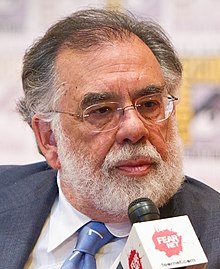Francis Ford Coppola
| Francis Ford Coppola | |
|---|---|

Francis Ford Coppola at the 2011 San Diego Comic-Con International
|
|
| Born |
April 7, 1939 Detroit, Michigan, United States |
| Residence | Napa Valley, California, United States |
| Education | Great Neck North High School |
| Alma mater |
Hofstra University UCLA |
| Occupation | Film director, screenwriter, film producer |
| Years active | 1962–present |
| Home town | Woodside, Queens, New York City, New York, United States |
| Political party | Democratic |
| Spouse(s) |
Eleanor Jessie Neil (1963–present) |
| Children |
Gian-Carlo Coppola (deceased) Roman Coppola Sofia Coppola |
| Parent(s) |
Carmine Coppola Italia Pennino Coppola |
| Family |
Talia Shire (sister) August Coppola (brother) Nicolas Cage (nephew) Jason Schwartzman (nephew) Robert Schwartzman (nephew) Marc Coppola (nephew) Gia Coppola (granddaughter) |
Francis Ford Coppola (US pronunciation: /ˈkoʊpələ/; born April 7, 1939) is a semi-retired American film director, producer, and screenwriter. He is considered to have been a central figure of the New Hollywood wave of filmmaking.
After directing The Rain People (1969), he co-wrote the 1970 film Patton, earning the Academy Award for Best Original Screenplay along with co-writer Edmund H. North. His directorial prominence was cemented with the release in 1972 of The Godfather, a film which revolutionized movie-making in the gangster genre, earning praise from both critics and the public before winning three Academy Awards—including his second Oscar (Best Adapted Screenplay, with Mario Puzo), Best Picture, and his first nomination for Best Director.
He followed with The Godfather Part II in 1974, which became the first sequel to win the Academy Award for Best Picture. Highly regarded by critics, it brought him three more Academy Awards: Best Adapted Screenplay, Best Director and Best Picture, and made him the second director, after Billy Wilder, to be honored three times for the same film. The Conversation, which he directed, produced and wrote, was released that same year, winning the Palme d'Or at the 1974 Cannes Film Festival. He next directed 1979's Apocalypse Now. Notorious for its over-long and strenuous production, the film was nonetheless critically acclaimed for its vivid and stark depiction of the Vietnam War, winning the Palme d'Or at the 1979 Cannes Film Festival. In 1990, he directed the second Godfather sequel, The Godfather Part III, which he considers to be the series' epilogue. Coppola is one of only eight filmmakers to win two Palme d'Or awards.
...
Wikipedia
